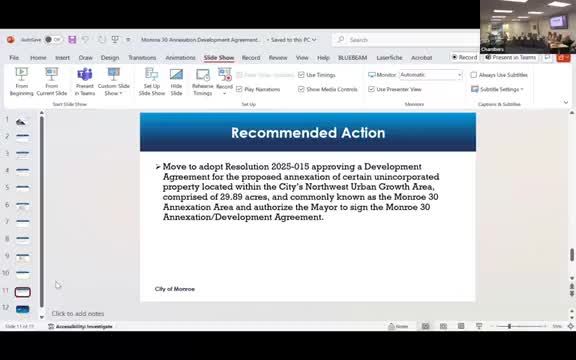Monroe adopts ADU code changes to meet HB 1337; council defers SDCs until sale and asks staff to return on impact fees
Get AI-powered insights, summaries, and transcripts
Subscribe
Summary
The council approved changes to city code to implement House Bill 1337 for accessory dwelling units and voted to defer system development charges for ADUs until separate conveyance; council asked staff to return with versions of transportation and park impact‑fee ordinances that likewise defer fees until transfer.
The Monroe City Council moved June 10 to implement state changes for accessory dwelling units and to set policy on related development fees. Council approved first reading of the ADU code amendments to align Monroe Municipal Code with House Bill 1337 by a 5‑0 vote, and later approved a system‑development‑charge (SDC) ordinance that defers SDCs for an ADU until the unit is conveyed or sold separately (the “Arlington” model), also by a 5‑0 vote. Council directed staff to return with versions of the transportation impact‑fee and park impact‑fee ordinances that apply the same deferral approach.
Why it matters: House Bill 1337 loosens several local permitting limits on ADUs statewide; Monroe’s code changes implement the law while retaining limited local flexibility. The fee decisions determine whether homeowners can add ADUs now with lower up‑front costs or whether the city collects full infrastructure fees later if an ADU becomes its own separate unit.
City planning staff, led in the presentation by Miss Sprague, told council the state law deadline is June 30, 2025 and that the ordinance before council implements the state requirements while adding modest local flexibility in permit processes. Sprague summarized the package as amendments to multiple chapters of the Monroe Municipal Code and said, “the city must adopt the requirements by June thirtieth of 2025, or the state law is supersedes our code.” Council then debated several discrete topics raised during the earlier public process: whether to allow ADUs in mixed‑use zoning districts, roof‑height limits for ADUs, and how to treat impact fees and system development charges.
On mixed‑use zones: staff described complications of allowing ADUs in zones that permit triplexes, townhomes or multifamily buildings; if ADUs are allowed in those zones, the city would have to allow them “in conjunction with those other residential building types,” which could require additional design standards. Council voiced concern about unintended consequences for the city’s recently adopted 2024 comprehensive plan goals for concentrated density in mixed‑use districts. By consensus, council asked the Planning Commission to examine whether and how ADUs should be allowed in mixed‑use zones and to return with recommendations.
On roof heights: state law restricts local governments from setting ADU roof height limits below 24 feet. Staff recommended treating concerns about scale and neighborhood compatibility through updated design standards rather than by a city‑wide numerical ADU height cap. Councilmembers who represent Monroe’s downtown neighborhoods raised concerns about preserving historic character; others pointed out that 35‑foot structures already exist and that local design standards can be applied to specific districts. Council asked staff to return with recommended design‑standard updates for areas such as the downtown infill zone.
On fees and SDCs: council engaged in an extended discussion about how fees affect the practical ability of residents to add ADUs. Staff presented two fee approaches for SDCs: (1) defer SDCs until the ADU is sold or conveyed as a separate unit (Arlington model), or (2) require an upfront SDC at reduced (50%) rate when the permit is issued. Council approved option 1 (defer until conveyance) for system development charges by ordinance (Ordinance No. 012/2025) on a 5‑0 vote. That ordinance requires no upfront SDC at the time of permit but collects the applicable SDC should the ADU later become its own conveyable unit.
Council did not adopt transportation or park impact‑fee ordinances that evening. Staff had presented draft 50% impact‑fee rates for ADUs, but after council discussion the body asked staff to prepare alternative ordinances that would defer the transportation and park impact fees until sale or conveyance of an ADU (the same Arlington model) and to return for council consideration. Staff also was directed to report back periodically with data on ADU permits and transfers so the council can revisit fee policy with actual program metrics.
Clarifying context and costs: staff noted Monroe currently averages about one permitted ADU per year; planners estimate the new law could raise that number, with one professional projection cited around 10 per year. Councilmembers and staff discussed current permit cost benchmarks: one councilmember said current total permit costs are “around $7,000” and noted proposed full packages of fees could raise that substantially in some scenarios; staff presented modeled total cost ranges across neighboring cities and the Monroe options (roughly $11,000 to $26,000 in some model scenarios, depending on choices and whether physical meter/connection charges apply). Council members expressed concern about preserving access for households adding ADUs for family or caregiving reasons while also protecting city infrastructure financing.
What’s next: the ADU ordinance implementing HB 1337 was approved on first reading (motion passed 5‑0); staff will publish the adopted changes per the city’s ordinance procedures. The council approved the SDC deferral ordinance (Arlington model) on first reading (5‑0). For transport and park impact fees, staff will draft deferral (Arlington) versions of the ordinances for council review and return with a recommendation and periodic program data reporting.
